
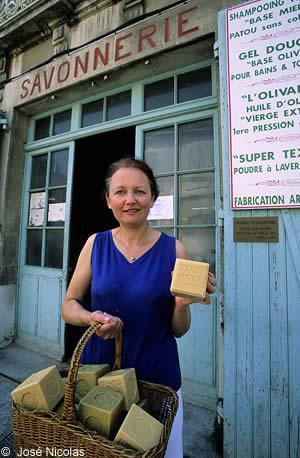
For a few decades, from 1870 to 1930, thanks to the wholesale market for olive oil and soap, Salon de Provence experienced an extraordinarily productive period before a brutal collapse. It is history that has been a bit forgotten by the Salon of today.
Let's go back to the age that left the city an important architectural heritage and a know-how still put to good use by two undaunted soap-makers that have carried on since that great era, Marius Fabre and Rampal-Latour.
The soap of fortune
Salon's olive oil making tradition allowed for the city's economic boom and in particular its conversion to Marseille soap.
“For a long time geared towards olives, in the second half of the 19th century, following in the wake of Marseille, Salon steered itself towards soap. Don't forget
that the famousMarseille soap is made with vegetable oil, and the most often olive oil… Several factors combined to create an unexpected economic upturn that
transformed Salon from a big yet rural market town at the junction of several routes into a commercial city of intense activity, extremely profitable for some,
manufacturers, businessmen or merchants”, explains Magali Allègre, president of the association Amis du Patrimoine of Salon and the Crau..
In 1870, a massive frost massacred the olive orchards throughout Provence. Only the regions around Marseille, Berre and the Alpilles were spared this climatic
catastrophe and they then decided to intensify their production by progressively mechanizing it.
In 1871, the Paris-Lyon-Marseille railway line was extended from Avignon to Salon and, two years later, continued to Miramas, approaching Marseille, a highly active
port and big importer of colonial oleaginous products. Salon built itself a station, crucial for the trade. Soon, more than a hundred handlers loaded and unloaded
raw materials from the tropics and finished products destined for the five continents.
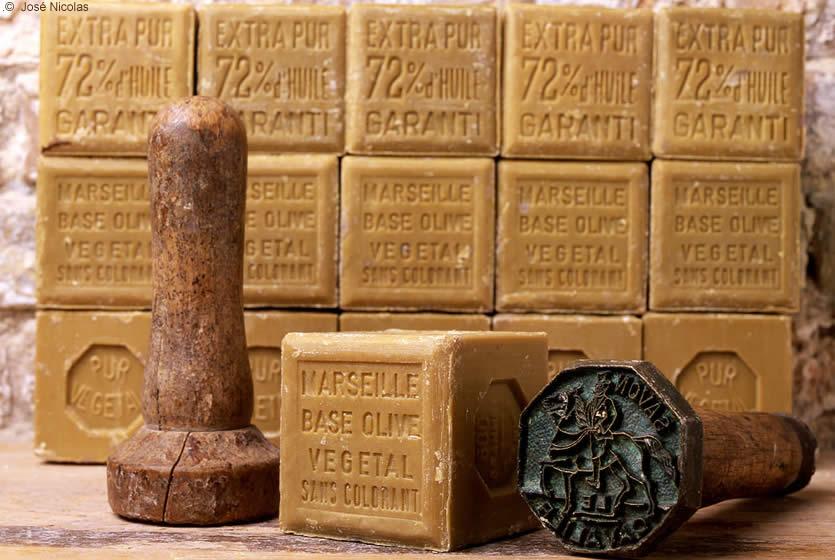
Stamped Marseille soap
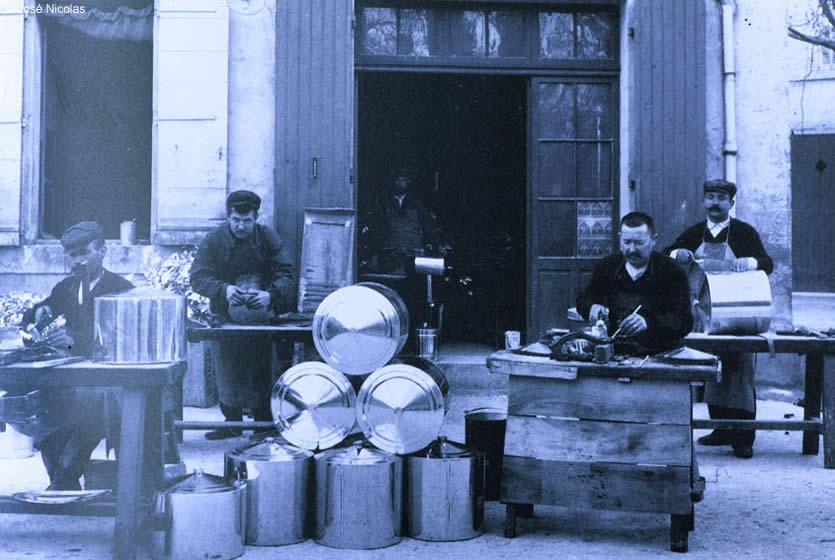
Tinware company in Salon de Provence
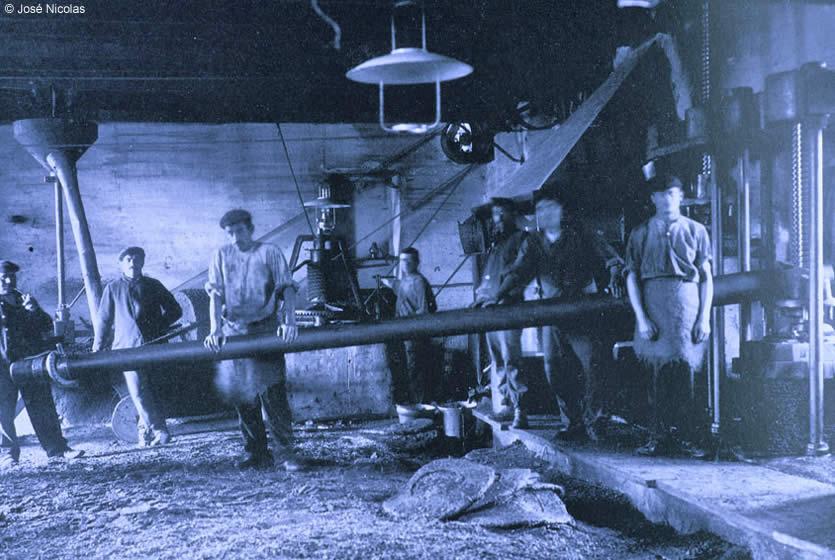
Savonnerie Lurian soap-makers, 1900, Salon de Provence
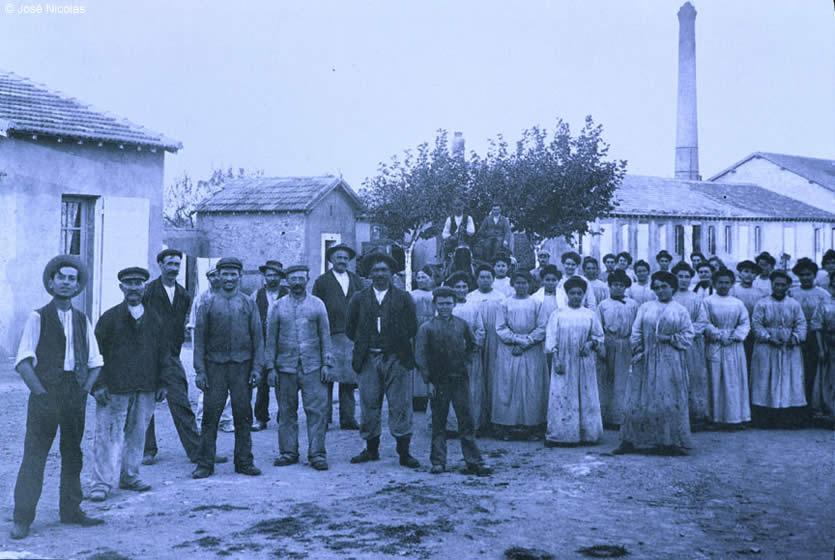
Personnel at the Savonnerie Lurian soap-making factory in Salon de Provence, 1900
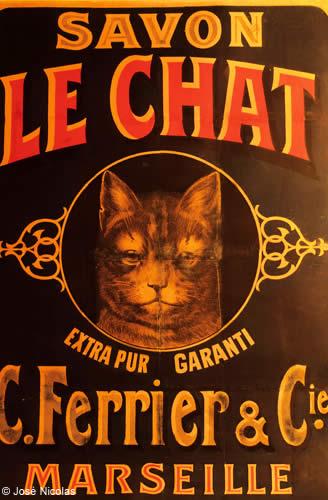
A powerful boom
With the progress in chemistry and toolmaking techniques, the conditions were right for the development of oil and soap factories as well as other industries and a
plethora of trading companies. “It's to the ambition of a whole generation of businessmen traders that the small city owes its magnificent embellishment
beautification”, continues Magali Allègre. At the same time, oil and soap factories engendered the creation of many related factories that contributed to the city's
wealth. “Of course, soap played a part in the wealthy past of Salon”, our fine history connoisseur adds. “But we should not forget the pallet-makers, generally
found by the sawmills (such as the Lèbre company still in operation on Avenue de l’Europe), the tinware companies that produced the containers or “estagnons” needed
to transport the oil (Vinatié for example), the coopers who made the barrels for shipment by sea, finally the workshops where the bottles and vats were covered in
wicker”. That's how Salon functioned, attentive to the quality of its production, delighted with the fortune and renown, the deserved rewards, that were not long in
coming. At the 1900 World Expo in Paris, it won the gold medal for the “quality of its exports and the dynamism of its commerce”.
The notables and well-to-do
Moreover, the commercial bourgeoisie was not content with just the economic success”, Magali adds, smiling. “Merchants and soap-makers quickly became the city
officials, taking charge of the affairs and the destiny of the city, for decades!”. In the armchair of the chief magistrate sat Alphonse Deiss, Joseph Barielle,
Alfred Anastay, Eugène Blayac, Baptistin Garcin, Auguste Girard and later Jean Francou, mayor of Salon for thirty years. Those who did not reach or did not aspire
to those duties did not, however, sit on the sidelines, participating in the city's influence through the intellectual and artistic circles that flourished in Salon
as they did in other opulent towns.
End of an era
Alas, prosperity is not synonym with perpetuity. WWI put the first and brutal brakes on the industry, compromising supply, the operation of the factories and
exports, while in the soap-making industry foreign competition started to appear. The crash in 1929 drove the final nail in the coffin. Decline continued, a page
quietly turned with WWII and the arrival of detergents from America. The demise came silently; Salon has kept no trace nor memory of this economic, and inevitably
human, drama. We don't know anything, for example, of the fate of all the women who worked in these industries, of which there were many”, regrets Magali Allègre.
Then, in 1933, as shrewd as it was traumatised, the city signed a convention with the ministry of armed forces providing for the creation of a flying school. Set up
in Salon four years later, it brought to the people of the city a manna of income and stable and permanent activity. Without talking about the prestige of the
Patrouille de France, of which the feats, and we cannot blame it, have helped to forget the sad downfall of the great centre of soap-making.
Other accommodations
Vacation rentalWhere to sleep?